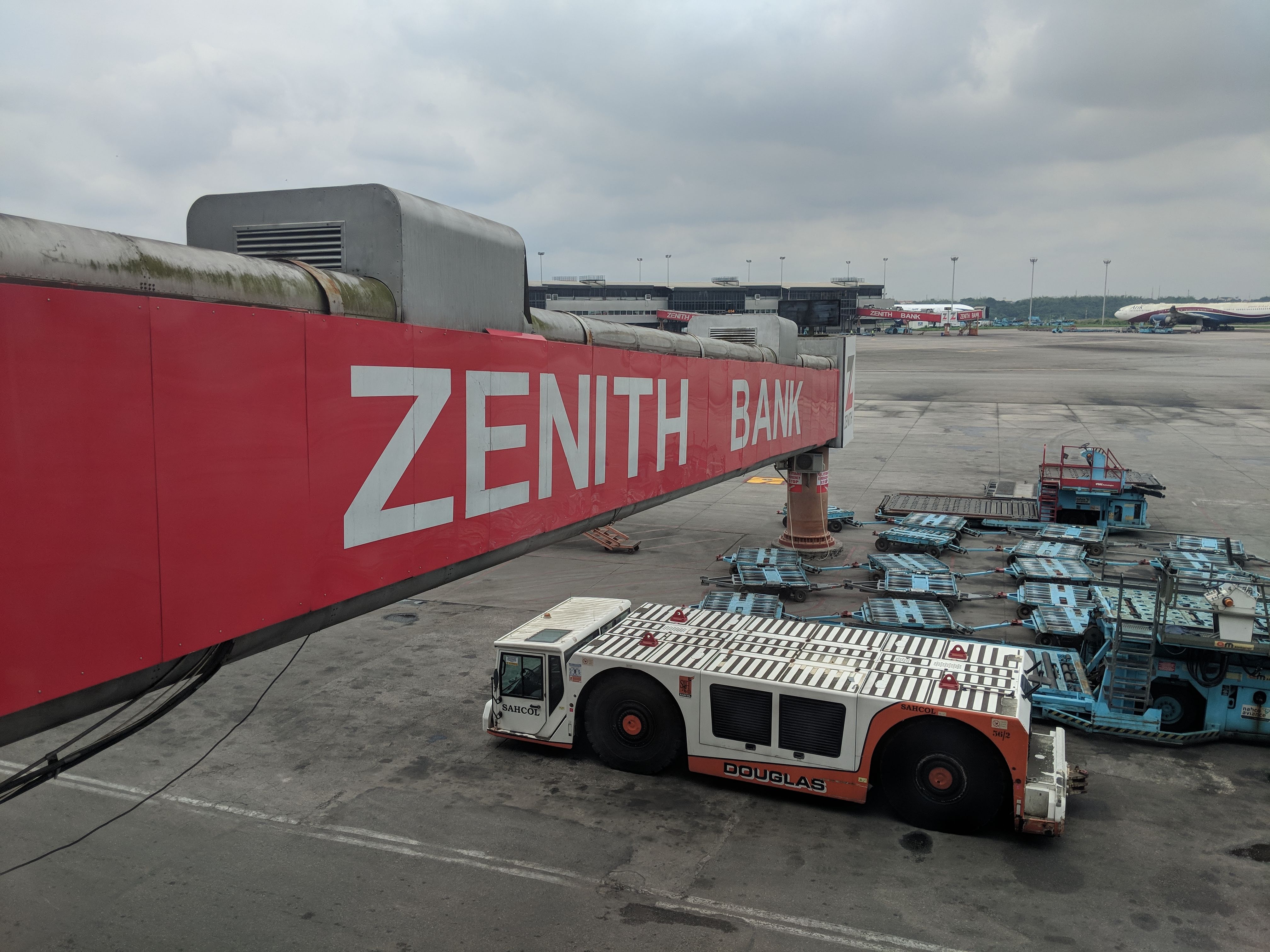THE FUND:

Zenith Bank: highly visible on the tarmac of Lagos’ international airport. Zenith performs well on gender equality in our ESG assessments.
The fund fell 1.1% in October, which was in line with the benchmark (-0.9%), but significantly better than MSCI EM Net TR (SEK) (-5.7%). The largest contributions were obtained from the fund’s positions in the Nigerian banking sector (+0.6% contribution) and the fund’s smaller position in Turkey (+0.5%). The largest negative contributions were obtained from the fund’s positions in Pakistan (-0.7%) and Egypt (-0.6%). Given the relatively weak development in most markets, the month’s positive contributions were mostly about what was not owned. Although we are relatively positive towards Pakistan, this was the market in which we decreased our holdings in October. We sold our remaining position in Allied Bank, a Pakistani bank, due to its valuation versus banks in our other markets. Additionally, we halved our position in one of the fund’s largest holdings, Meezan Bank. We have a positive view of the bank’s long-term growth opportunities given its strong brand in Islamic Banking (a segment that grows faster than the conventional banking sector). However, the valuation of P/E 15 and P/BV just above 2.5x is stretched compared to other banks in Pakistan, and even more so compared to banks in our other markets. We also sold our position in International Brands, an unlisted Pakistani consumer conglomerate, during the month. After the company’s prospective listing was delayed, we have been looking for an exit for some time. There remains a certain risk in the repatriation of cash (which requires, among other things, the central bank’s approval). If nothing unexpected happens, the position will be realised with a small profit versus the invested amount. No new companies were added during the month.
THE MARKET:
2018 has been a tough year for shareholders in emerging and frontier markets. This year’s development now is almost in line with the terrible performance in 2011. Emerging markets fell 18% in 2011 (USD), compared to 16% so far in 2018. Frontier markets fell between 18%-25% (FM and FMxGCC) in 2011, compared with 16-23% so far this year. 2011, however, was followed by a strong 2012 when the emerging market index rose 19%, FMxGCC increased 16% and FM increased 9%. There are always a range of concerns in emerging and frontier markets. These are true today as well. However, we want to note that these are well-discounted in the valuations across all our markets. We have seen significant corrections in most markets and many of the currencies in our markets are cheap after sharp depreciations in 2017 and this year. In order to get a bigger rotation of capital back to emerging and frontier markets, we believe that we need to see signs of the US economy slowing down and investors beginning to see the end of US interest rate hikes. Rising US long-term interest rates and a strong US stock market have meant tough competition for emerging and frontier markets. In 2018, it has meant less access to foreign capital, which meant that emerging and frontier markets could not finance growing current account deficits through inflows of direct and portfolio investments. Instead, the current account deficits have been closed by letting currencies weaken, making it more expensive to import goods for domestic consumers and the domestic industry. Now we are in a situation where the currencies of most emerging and frontier markets appear relatively cheap again. Should we simultaneously have a situation with increased inflows of foreign capital to their equity and bond markets, the upswing may be relatively fast and stronger than normal. The situation offers an opportunity to discuss the benefit of every fifth to seventh year experiencing such a painful adjustment with sharp downturns in the equity and foreign exchange markets. Unfortunately, the reality remains that foreign investors respond with a herd-like mindset when it comes to emerging and frontier markets. Patience and remembering past cycles are key when trying to determine the bottoms during weak periods. The focus should be on investing gradually over time, but perhaps a bit more after really weak periods, as has been the case in 2018.
ESG ENGAGEMENT:
Two Pakistani holdings, International Brands and Allied Bank were divested from the fund for financial considerations.
DISCLAIMER:
Capital invested in a fund may either increase or decrease in value and it is not certain that you will be able to recover all of your investment. Historical return is no guarantee of future return. The Full Prospectus, KIID etc. are available on our homepage. You can also contact us to receive the documents free of charge. Please contact us if you require any further information: +46 8-5511 4570.
Kundgrupp / Investortype:
* Ontario and Quebec